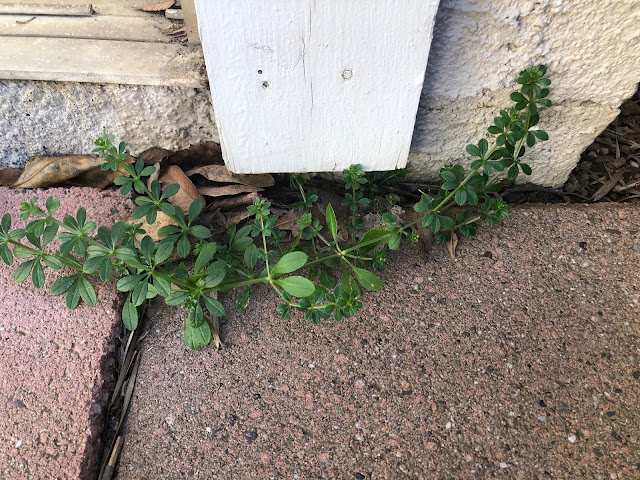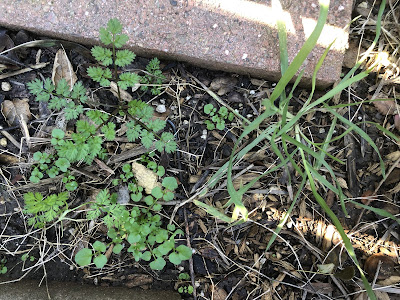
Get them out now for an easier spring

|
|
Bedstraw, a prickly weed hated by pet owners, already has grown quite a bit against a west-facing wall. But not for long. (Photos: Kathy Morrison)
|
The popular comic Pearls Before Swine last May had a strip that still decorates my refrigerator. In the first panel, Rat (the snarky character) asks Goat (the sensible one) what he's doing. Here's how the rest of it plays out:
Goat: Pulling the weeds in my garden.
Rat: We haven't had to do that at all in our garden this year.
Goat: Oh, yeah? What are you growing?
Rat: Weeds.
The last panel shows Rat talking to another friend, Pig. "No one appreciates my gardening tips," he says.
So ... unless you're like Rat and plan to have a garden of weeds this year, here's my gardening tip: Get them out while they're small.
Our weather has been just nice enough that weed seeds, fed by December's rains, are now sprouting all over. It can be hard to identify weeds without their flowers, but now is when it's easiest to get rid of them.

|
|
A sampler of the types of weeds you may already see in the
garden, including little bittercress (lower left and a small one
top center) and grasses. The carrot-looking plant top left also is a weed. |
-- They hog water and nutrients that could be going to wanted plants.
-- They harbor pests (insects and rodents) and pathogens that can sneak up on seedlings and transplants.
-- The roots only grow stronger and tougher to eradicate.
-- Allowed to grow and flower, some weeds then spread by underground runners, tubers or rhizomes, or burrs that attach to pets' fur. Others produce allergens.
The UC Integrated Pest Management Program (UC IPM) filmed a great talk on weeds last year with John Roncoroni, a retired UCCE weed science farm adviser. He discusses ways to identify weeds, but also covers the why of controlling weeds, and priorities for tackling them. Here's the link to the YouTube video . (It's about 39 minutes.)
So whether you prefer using a sharp hoe, or a trowel or specialized weeding tool, tackle the weeds now -- before you need a shovel.
Or give up, like Rat, and just grow weeds.
----
Here are links to some of our previous posts on weeds:
Is this the worst weed in Sacramento? (nutsedge)
Eeek! It's weed season already (5 problem plants to get rid of now)
Comments
0 comments have been posted.Sacramento Digs Gardening to your inbox.
Sites We Like
Garden Checklist for week of July 21
Your garden needs you!
* Keep your vegetable garden watered, mulched and weeded. Water before 8 a.m. to reduce the chance of fungal infection and to conserve moisture.
* Feed vegetable plants bone meal, rock phosphate or other fertilizers high in phosphate to stimulate more blooms and fruiting. (But wait until daily high temperatures drop out of the 100s.)
* Don’t let tomatoes wilt or dry out completely. Give tomatoes a deep watering two to three times a week.
* Harvest vegetables promptly to encourage plants to produce more. Squash especially tends to grow rapidly in hot weather. Keep an eye on zucchini.
* Pinch back chrysanthemums for bushy plants and more flowers in September.
* Remove spent flowers from roses, daylilies and other bloomers as they finish flowering.
* Pinch off blooms from basil so the plant will grow more leaves.
* Cut back lavender after flowering to promote a second bloom.
* It's not too late to add a splash of color. Plant petunias, snapdragons, zinnias and marigolds.
* From seed, plant corn, pumpkins, radishes, winter squash and sunflowers.